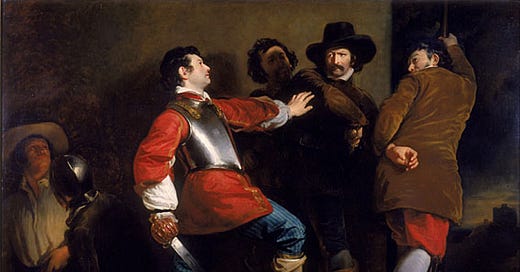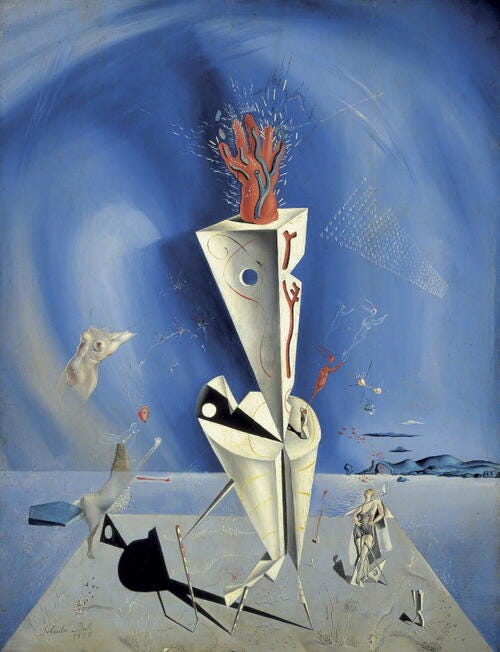I teach plot. I study plot. My novels, so far, have all had plots. So do my favorite books by my favorite authors—Henry James, Anita Brookner, Tessa Hadley, Patricia Highsmith, Muriel Spark, Kelly Link, Helen Oyeyemi, Jennifer Egan, and yes, Virginia Woolf.
Yet when I teach and coach, I often find myself defaulting to the word “story” instead. This is fine; colloquially, the two words are used more or less interchangeably. But I have noticed that I lean on “story” much harder when I’m trying to make a case for its value.
This is no accident. Most novel-writing craft books begin by distinguishing between the two, in the service of elevating story over plot. Plot is “what happens”; story is “how it’s told.” Plot is the content; storytelling is the form. Plot is a meet-cute, a car chase, an alien invasion; storytelling is an ancient art, a science, an instinct hard-wired in the brain. Plot is a formula; storytelling is what makes us human.* [←please humor me, read this footnote]
It’s strange, then, that after Good as Gone came out, so many writers I know asked me for help learning how to plot. Shouldn’t they have been asking me about story?
But no one has ever asked me out to coffee to pick my brain about storytelling. Not once. It’s plot every time. Plot, plot, plot.
Image: The Discovery of the Gunpowder Plot and the Taking of Guy Fawkes, circa 1823, Henry Perronet Briggs (1793–1844)
When did story start crushing plot in the discourse?
If I had to guess, I’d say that the current prejudice for story over plot actually comes from the world of screenwriting. Robert McKee’s hugely influential 1997 screenwriting guide is called Story, the word monumentalized on the cover in shadow-throwing capital letters that look more like Stonehenge than a marquis. On the first page of the introduction, McKee announces, “Story is about eternal, universal forms, not formulas.” In the book, he continually makes a case for story as something distinct from plot and worthy of study.
To hook one’s craft to something universal and essential makes sense for a discipline that was and still is often portrayed as hackwork (not least in television and films). Soon after McKee’s book came out, the tech and business worlds followed suit, borrowing the word directly from McKee’s book to sanitize and elevate their processes and products, as in this 2003 Harvard Business Review article.
But as we see in the latter example, the uncritical valorization of storytelling can mask problems. First of all, claims for storytelling as a monolithic, universal art flatten differences—cultural, neurological, historical—in problematic ways. Stories are inherently selective, contextual, and rhetorical; this means they can easily be bias-confirming, and at their worst, can legitimize harmful regimes and conspiracy theories. But even when stories are deployed with the best of intentions, they can oversimplify and obscure useful information, leading to unintended results. (Michael Hobbes and Peter Shamshiri frequently discuss this phenomenon in the podcast If Books Could Kill.)
If all this seems like a wild digression from the question of plot v. story, I apologize. I don’t mean to debunk story as a useful tool for writing novels. I just want to let some air out of the hot air balloon. To the extent that story can be distinguished from plot, it is a) rhetorical and b) carries a lot of baggage with it. The way we use it is biased toward capitalist, individualist, and western ideas of narrative and personhood.
Is there a meaningful distinction between plot and story?
Maybe? I think one reason people don’t often ask for help with story is that stories feel personal, while plots tend to feel more generic or formulaic. We ask for the story of someone’s life, not the plot. If we ask for the story of a film or book, we are generally treated to something overarching: “Barbie is about a doll who represents an outdated societal ideal of womanhood learning how to be imperfect, inspiring modern-day women to embrace their imperfections.” Now tell me the plot of Barbie: “Barbie wakes up in Barbieland one day and realizes she has thoughts of death. She visits Weird Barbie, who explains what’s going on and sends her to the human world, where she encounters the patriarchy for the first time…” The more detail we go into, the more “plotty” the synopsis feels.
But the frequent assertion that “plot is chronological, [while] a story may unfold nonsequentially” isn’t just oversimplified; it’s hogwash. If plot were chronological, we would start our plot summary of Barbie with the thing that technically happens first: “Well, there’s this mom who works at Mattel who’s depressed, and she starts drawing sad Barbies…” I defy you to find someone who describes the plot of Barbie that way.
And why are we always insisting that storytelling is universal, and plot is formulaic? If stories feel personal in the sense that they are intrinsic to our experience of our life stories, then shouldn’t they be more specific than plot? And isn’t a formula sort of by definition widely, if not universally, applicable—so, more universal? At a certain point, these types of value claims start to feel totally meaningless.
So, is there ANY distinction between them?
Freely acknowledging that there are no absolutes within language, here’s my stab at defining plot and story:
Plot is what makes a story happen; story is the meaning we put on plot. The second you tell it, plot turns into story. The second you try to explain a story, you begin relating the plot. They are distinct, but so intertwined as to be nearly inseparable.
Not all novels are stories.** But most are. And I’m pretty sure all stories have plots. Virginia Woolf’s The Waves has a plot. Carmen Maria Machado’s In the Dream House has a plot. Julio Cortazar’s Hopscotch has a plot. If a novel tells a story of any kind (and these novels demonstrably do), it has a plot.
Surely, the role of plot relative to the story is a matter of emphasis, meaning, and context. The Waves wouldn’t be The Waves if it were written in straightforward language. The way in which it is written carries a tremendous amount of meaning. If it’s true that these formal elements can’t be paraphrased in the exact same way plot can, they can still be described with a great deal of accuracy, their meaning paraphrased. (Critics do it all the time.) Even the most ruthless plot summary selects, prioritizes, chooses a point of view. Story kicks in right away. There is no need to fall all over ourselves praising it.
Image: Apparatus and Hand, Salvador Dali, 1927.
Writers, if things happen in your book, then it already has a plot; you do not have to abandon the type of story you want to tell in order to focus on strengthening that plot and controlling the meaning others take from it. Just say plot! You too, storytelling gurus! We don’t have to confine it to whispers. Plot is difficult and interesting enough on its own. Otherwise, people wouldn’t be whispering about it in the first place.
* Bullshit!!!!!! We’re human even if we can’t tell or hear or think in stories. To say otherwise is to slap the label “truth” on a biodeterminist, essentializing construction. This is the kind of distinction that, when taken to extremes, can be used to justify the worst kinds of racism, ablism, etc. I mean, I guess anything can, but whenever people start talking about “what makes people human,” I just full-body cringe.
**Though one could argue that the most experimental novels depart from the novel form. Again, semantics.





